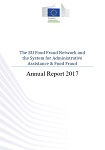Foodlaw-Reading
Dr David Jukes, The University of Reading, UK
![]()
|
|
Commission Publication, 28 March 2018
The Commission has published a report covering activities in 2017. Given below is the Introduction to the report
 |
The EU Food Fraud Network and the System for Administrative Assistance & Food Fraud - Annual Report 2017 A copy of the report is available on this site (click on image) |
Introduction
This report presents statistics for the year 2017 on the cases exchanged in the AAC (Administrative Assistance and Cooperation System). You will notice an increase in the number of cases, both in the AAC-AA and the AAC-FF, which shows that, although there is no obligation to use the system, the competent authorities in the Member States have now taken the habit to use the system for requests regarding non-compliances and suspicions of food fraud to their counterparts in other Member States.
This report also gives some examples of EU-coordinated cases dealt with in 2017. In this context, it should be noted that DG SANTE has strengthened its cooperation with the Joint Research Centre (JRC), which provides support in the area of analytical testing methods to detect fraud in the food chain, with other Directorates-General in the Commission such as DG AGRI, MARE, TAXUD and OLAF, with the European Food Safety Agency (EFSA) for the risk assessment of emerging risks regarding food fraud, and with Europol in the framework of the international cooperation towards the coordination of police investigations as illustrated in some of the examples given below.
The preparatory work on the Integrated Management System for Official Control (IMSOC), which will integrate current EU-managed IT systems such as TRAde Control and Expert System (TRACES) and the EU’s alert systems (RASFF/AAC and EUROPHYT), as foreseen by the new Official Control Regulation, started in 2017.
One of the priorities set following the High-level meeting of 26 September 2017 held in the wake of the fipronil incident (see page 15) was to explore where communication chains and the use of the alert systems such as the Food Fraud/Administrative Assistance and Cooperation, the Rapid Alert System for Food and Feed (RASFF) and the Trade Control and Expert System (TRACES) can be improved to enhance efficient detection and coordination of food fraud. In consequence, legislative adjustments will be needed in 2018 as well as the development of a combined platform for the RASFF and Administrative Assistance and Cooperation (AAC) systems in order to bridge the gap between the two systems (see schemes of current and future RASFF/AAC workflows below).